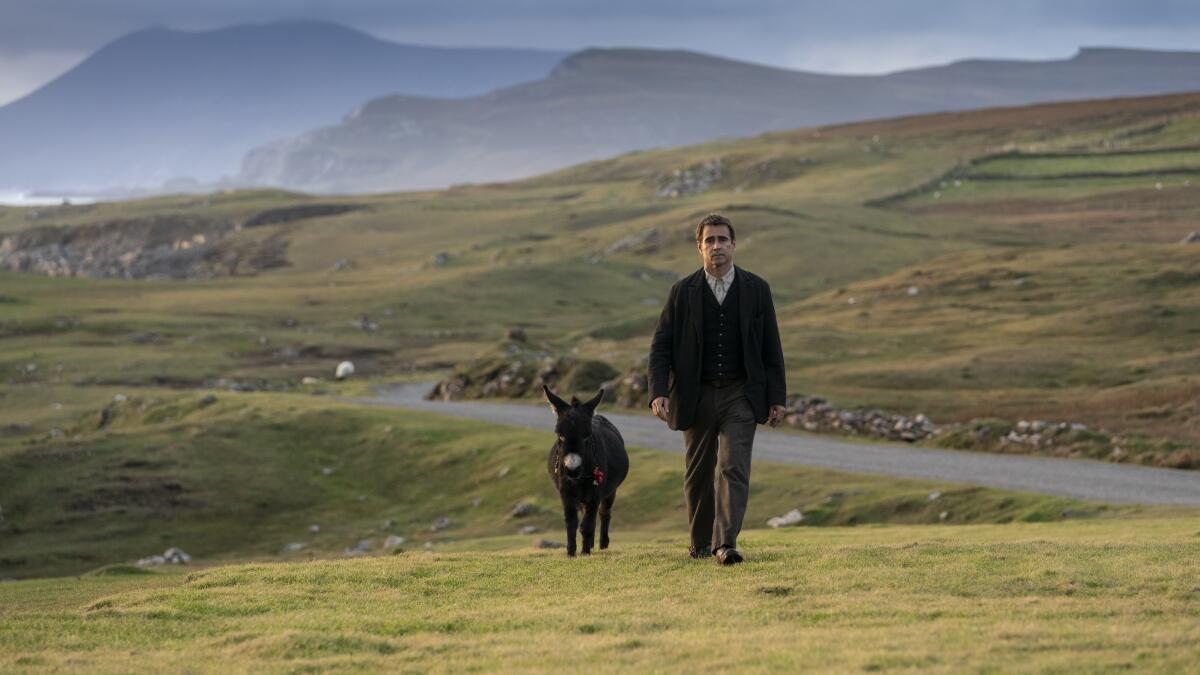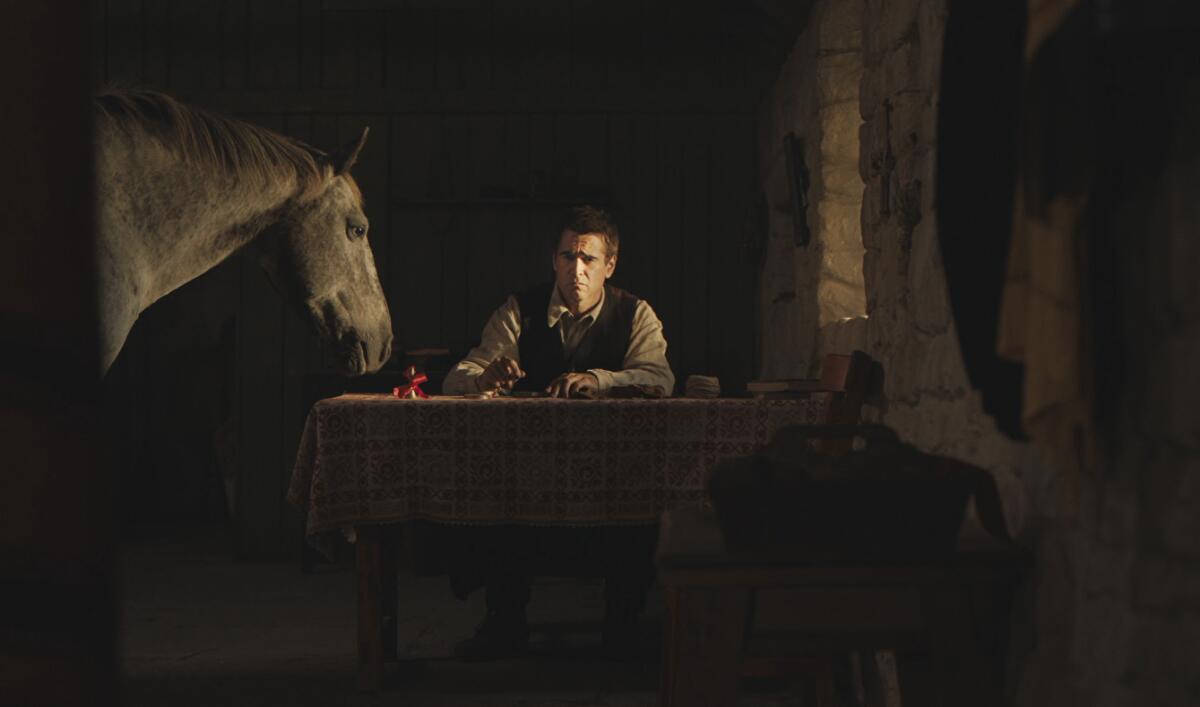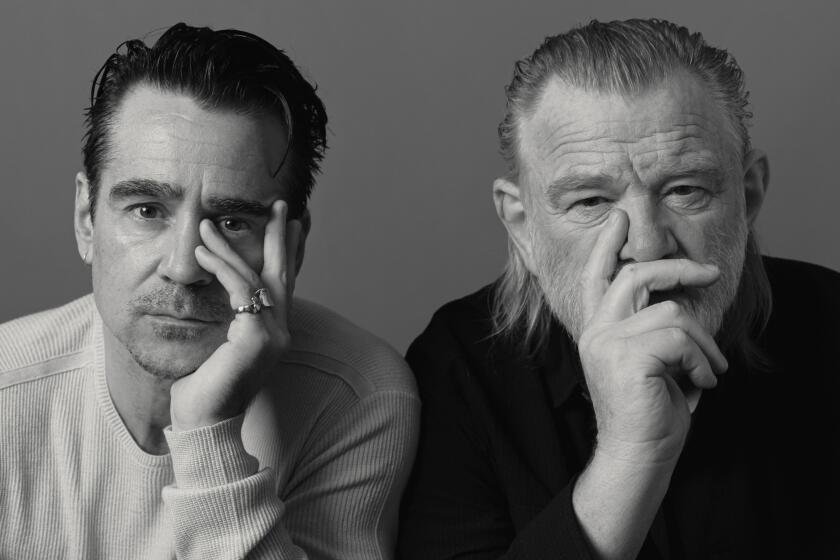Review: In buddy breakup drama ‘The Banshees of Inisherin,’ all’s Farrell in love and war

It’s hardly an original insight to note that “The Banshees of Inisherin,” Martin McDonagh’s caustic and mournful new movie, is also his latest work to give its location top billing. Longtime admirers of this British-Irish writer-director’s stage work know his fondness for regionally specific titles like “The Cripple of Inishmaan” and “The Lieutenant of Inishmore,” two plays that — together with this film — form a loosely connected trilogy, tied together not by common characters but by common ground. If character is destiny in McDonagh’s work, then both are also inextricably tied to location and landscape. Here, as before, he draws us into an insular Irish enclave, where the air is thick with salty insults and bitter laughs, and cruelty seems to well up from the soil like highly acidic groundwater.
Which is not to suggest that Ireland — either the country of McDonagh’s firsthand experience or the one of his fictional imagination — has a monopoly on cruelty. That much is clear from his farther-flung plays, like “A Behanding in Spokane,” and also from his movies such as “Three Billboards Outside Ebbing, Missouri” and “In Bruges.” That 2008 comedy’s co-leads, Colin Farrell and Brendan Gleeson, are superbly reunited in “The Banshees of Inisherin,” only this time, rather than playing two hit men on a less-than-idyllic Belgian holiday, they’re playing longtime best friends who have never known any home beyond Inisherin. And from our first glimpse of this small, fictional island, with its lush greenery and not-infrequent rainbows (beautifully filmed by Ben Davis), that might not seem like such a bad state of affairs.
For your safety
The Times is committed to reviewing theatrical film releases during the COVID-19 pandemic. Because moviegoing carries risks during this time, we remind readers to follow health and safety guidelines as outlined by the CDC and local health officials.
By movie’s end, we know better. The year is 1923, and in the distance the Irish civil war is raging, providing some blunt yet hazy thematic scaffolding for this more intimate tale of men in conflict. The beauty of Inisherin will soon turn sour and corrosive, much like the once-harmonious friendship between Pádraic Súilleabháin (Farrell), a sweet-souled dairy farmer, and Colm Doherty (Gleeson), a gruff, gimlet-eyed fiddle player. In the opening scene, Pádraic sets out to meet Colm for their usual afternoon pint, only to find the man sitting at home, his back to the window, quietly ignoring Pádraic’s knocks and entreaties. Can a man scowl not just with his face but with his entire hulking frame? Somehow, Gleeson manages.
Bewildered by this silent treatment, Pádraic remains unperturbed — surely it must be some sort of joke or misunderstanding — and refuses to accept that the friendship is over, even after Colm later spells it out for him down at the pub: “I just don’t like ya no more.” After a pause that lasts a small eternity, Pádraic responds, with a mix of confusion, disbelief and heartache that Farrell plays to perfection: “Ya do like me!” And the funny thing is, he’s right. Colm’s abrupt decision stems not from a lack of affection but a lack of time: Gripped by despair and newly aware of his encroaching mortality, he wants to live out his days playing and composing music, the only thing that provides him with any semblance of comfort or meaning. He also wants to consume his last pints in peace, away from Pádraic’s incessant yammering.

Incessant yammering, of course, is one unflattering if essentially correct way to describe McDonagh’s own flavorsome dialogue, which uses staccato rhythms and purposeful word repetitions to generate a sustained back-and-forth almost as musical as Carter Burwell’s lovely score. Apart from “feck,” the favored expletive of this early 20th century Irish milieu, the script’s most frequently deployed four-letter words are “dull” and “nice,” two words that are often hurled in Pádraic’s direction. Agreeable and simple-minded, Pádraic gets along with just about everyone, from his sharp-as-a-tack sister, Siobhan (a flat-out wonderful Kerry Condon), to the animals placed in his reliable care. (None of the latter is more beloved than his miniature donkey, Jenny, the most important member of the movie’s splendid four-legged ensemble.)
Colm’s rejection of Pádraic is also, in its way, a rejection of the tyranny of niceness, and an assertion that greatness — whether in the form of a Mozart symphony or, God willing, the humbler violin piece he’s trying to compose — is of far greater value. All of which opens up a rich, thorny dialogue concerning McDonagh himself, who likes to blur the lines between humanism and nihilism, and who in “The Banshees of Inisherin” comes perhaps as close to greatness as he’s ever gotten. One measure of the movie’s skill, and its generosity, is that it embraces the wisdom of both its protagonists. You’ll share Colm’s exasperation and defend his right to pursue an unimpeded life of music and the mind, but you’ll also concede Pádraic’s point that kindness and camaraderie leave behind their own indelible if often invisible legacies.

Muddying the waters still further: Colm, despite his strict enforcement of boundaries (including a not-so-idle threat to harm himself if Pádraic doesn’t leave him alone), nonetheless finds ways to treat his hapless former friend with decency and compassion. Meanwhile, Pádraic, for all his talk of niceness, is the one whose escalating harassment of Colm takes on menacing overtones, lubricated by whiskey, desperation and anger. To watch these two characters rage against each other is to acquire an entirely new understanding of what happens when an unstoppable force meets an immovable object. And no one ultimately understands that dynamic better than Siobhan, who — as both Pádraic’s loyal, loving sister and the one person on Inisherin who can keep intellectual pace with Colm — could hardly be more divided in her sympathies.
Siobhan’s presence — and her own fiercely individual decisionmaking — opens up another dialectic. Although centered on the conflict between two equally unyielding men, the movie is no less about the tension between a small, isolated community and the vast world that lies beyond its overcast horizon. Mocked by the provincial townfolk for being single and bookish, Siobhan is eyeing her own possible escape. And who can blame her? “The Banshees of Inisherin,” like much of McDonagh’s earlier work, uses its physically remote setting to map out an entire human cosmos of greed, spite and self-delusion, populated by characters including a gossipy shopkeeper (Bríd Ní Neachtain), a physically abusive policeman (Gary Lydon), a witchy prophesier of doom (Sheila Flitton) and, on the more likable side, a village idiot named Dominic (Barry Keoghan).
From ‘In Bruges’ to ‘Saturday Night Live,’ the ‘Banshees of Inisherin’ co-stars have never had a problem picking up where they left off.
With the exception of Dominic, a perpetual troublemaker whom Keoghan invests with wit, mischief and unexpected pathos, none of these peripheral characters reveals more than one or two dimensions. If “The Banshees of Inisherin” marks a significant improvement on the wildly uneven “Three Billboards,” it still doesn’t entirely shake off some of the reflexively glib, cynical aspects of McDonagh’s writing, namely his tendency to reduce some of his characters to one-note personalities, or to make them the butt of cruel comic (and sometimes cosmic) punchlines. They are the playthings of a God who dispenses punishments with a whimsical, even arbitrary hand, and whom few of these habitual churchgoers — maybe not even the meddlesome priest (David Pearse) who’s enlisted to mediate the central conflict — ultimately really trusts or believes in.
And so Colm is only right to be consumed with despair. Which doesn’t make Pádraic wrong to assume that there are salves for life’s woes, and that he might, in fact, be one of them. Farrell’s performance, one of the finest he’s ever given, is a balm in itself, a thing of rough-hewn simplicity and exquisite delicacy, nailing comic beats and striking emotional chords with the same deft touch. Without ever turning leaden or oppressive, he shows us a man who isn’t the same by movie’s end, who’s experienced more loss, fury and grief than he’d ever thought possible. All he can count on anymore, really, is the ground beneath his feet — and in that respect at least, McDonagh suggests, he may be far less alone than he realizes.
‘The Banshees of Inisherin’
Rated: R, for language throughout, some violent content and brief graphic nudity
Running time: 1 hour, 54 minutes
Playing: Starts Oct. 21 at AMC the Grove, Los Angeles; AMC Century City
More to Read
Only good movies
Get the Indie Focus newsletter, Mark Olsen's weekly guide to the world of cinema.
You may occasionally receive promotional content from the Los Angeles Times.












